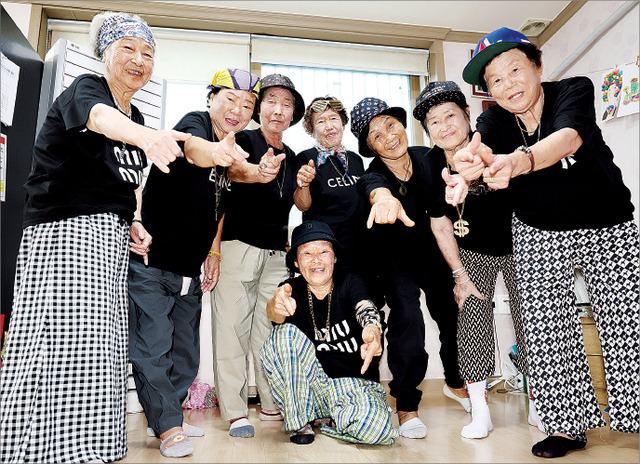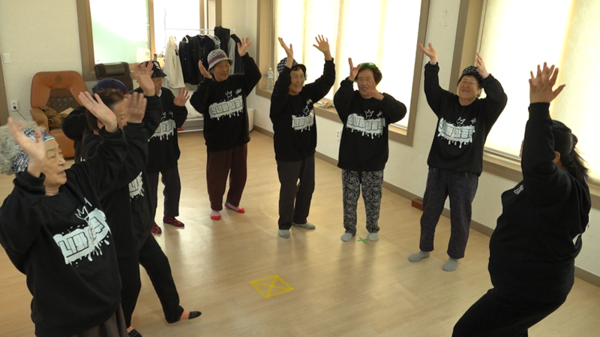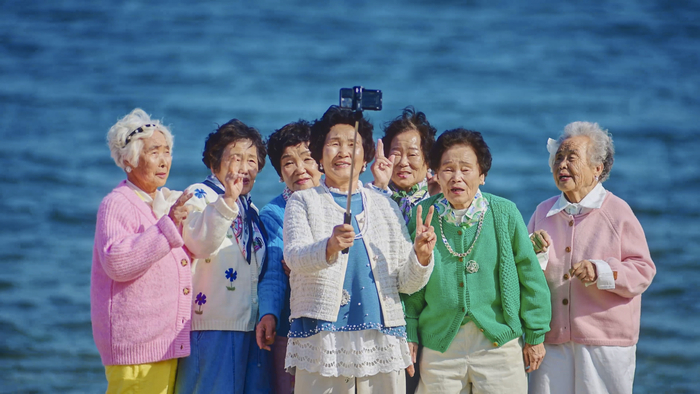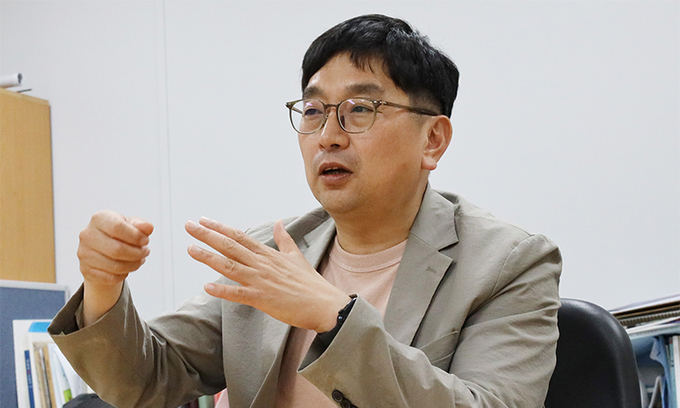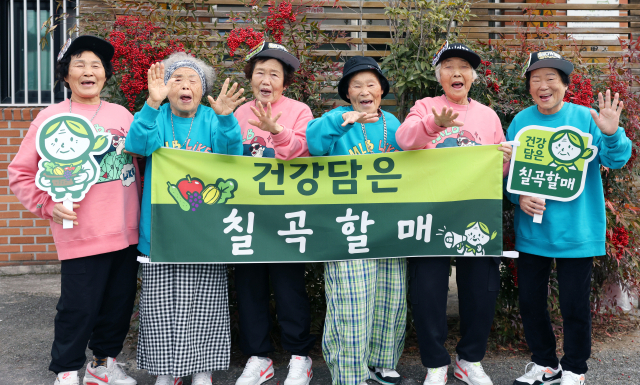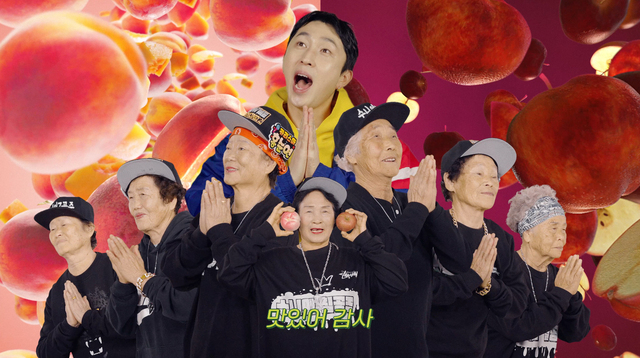[Case 29] Rapping into the Twilight Years: Chilgok Grannies Drop Beats—and Truths
Rapping into the Twilight Years:
Chilgok Grannies Drop Beats—and Truths
<Suni and the Seven Princesses, a granny rap group formed in Chilgok in 2023 (Photo: Chilgok County)>
[Hip-Hop at 85: Meet the world’s oldest rap crew]
“People say life gets gloomier as we grow older and near the end,” said Park Jeom-soon, leader of the octogenarian rap group Suni and the Seven Princesses, in an interview with Segye Ilbo when asked about her secret to healthy ageing. “But thanks to our music, we’re living our best lives.” She even rated her current happiness a perfect ten out of ten.
Formed in August 2023 by a group of grandmothers from Sin 4-ri, Jicheon-myeon, Chilgok County, Suni and the Seven Princesses is the world’s oldest rap group, with an average age of 85 (as of 2025). The group is led by 87-year-old Park Jeom-soon, mentioned above, and includes seven other members: Jeong Du-i (94), Hong Sun-yeon (82), Jang Ok-geum (77), Lee Pil-seon (89), Lee Ok-ja (80), Kim Tae-hee (80), and Lee Sun-hwa (77).
They first found their voice—not in music, but in learning to read. After mastering Hangul, the Korean alphabets, the group performed a rap and dance routine at the 2023 Gyeongsangbuk-do Literacy Festival—a showcase for adult learners. That performance sparked their transformation into rappers. On August 31, 2023, they officially launched their group at the village senior center—and by September, they even had a fan club, made up of daughters-in-law, grandchildren, and fellow villagers.
The group, Suni and the Seven Princesses, holds practice sessions every Tuesday and Thursday at 2 p.m. at the community hall in Sin 4-ri, Jicheon-myeon. While all the members are advanced in age and often need rest and move at a gentle pace, they say that practicing and performing gives them a new lease on life.
Their lyrics begin as poems, written by the members themselves. Ms. Jung Woo-jung, their manager and literacy instructor, later adapts them to better suit the rap genre. Marked by genuine emotion—ranging from the joy of learning to the pent-up sorrow of gender-based discrimination—their work strikes a deep chord with listeners. Notable tracks include “’Bout to Lose It,” which conveys the sorrow of missing out on education due to poverty and social bias against girls, and “Class in Session,” which celebrates their late-blooming joy of learning Hangul. War-themed pieces such as “Bang-Bang, Pop,” based on a childhood memory of mistaking gunfire for fireworks, and “Ppalgaengi” (The Reds), which recounts an encounter with a North Korean soldier, evoke the confusion and trauma of the Korean War.
I’d be weeping my eyes out while my homies hit the school.
Doing dishes, tending babies — that was my daily rule.
No dreams, just chores — I’m ’bout to lose it. (‘Bout to Lose It)
Class in session! Don’t get fooled by my wrinkles.
Got my backpack strapped, heading to class,
With my saggy homies still bringing the sass.
We bicker and laugh — who's right, who's not?
LOL, LOL — this life hits the spot. (Class in Session)
Heukjaetgol? Nah — maybe Songjeong Hill? Nope! Born the third girl in Hwanghak-gol, still. All my brothers got schooled. But me? School wasn’t in the script. Shoot, shoot, shoot! (The third girl in Hwanghak-gol)
Their passion-fueled venture into self-expression and stage performance attracted media attention both at home and abroad, leading to appearances in various TV programs advertisements, and government publicity content. Since their debut performance at the 2023 Gyeongsangbuk-do Literacy Festival, they have risen to national fame through appearances on Korean shows such as Morning Forum and Screening Humanity (Korea Broadcasting System), as well as NHK World TV in Japan. They also featured in a music video supporting Busan’s bid to host the 2030 World Expo, and performed at the opening ceremony of the 2024 Hangul Week held in Gwanghwamun Square, Seoul. In addition, they have taken part in promotional videos for various government agencies, including the Ministry of SMEs and Startups, the Ministry of Patriots and Veterans Affairs, and the Prime Minister’s Office. As of 2025, they remain active, with their latest appearance in the “Ocean Escape Month” campaign clip supporting marine tourism.
<Practicing rap with instructor Jung Woo-jung (Image: KBS1, from Screening Humanity)>
<Members taking a selfie by the sea in Tongyeong for a marine tourism campaign (Photo: Chilgok County)>
[From illiteracy to agency: Adult Hangul education as a path to transformation]
Behind the rise and success of Suni and the Seven Princesses are two essential forces: The national adult literacy program and the support of the Chilgok County Office with Public Relations Team Lead, Mr. Park Jong-seok at its helm. The adult literacy program is a nation-wide initiative aimed at helping low-educated and illiterate adults acquire basic literacy and numeracy skills equivalent to the elementary-to-middle school levels. Through the program, participants of the program experience a sense of fulfilment through learning and become better equipped to navigate everyday challenges.
This program is primarily operated by local governments and implemented through affiliated institutions such as community schools and lifelong education centers. The Ministry of Education supports these programs by providing funding for instructors and experiential learning activities. In particular, some programs directly managed by municipal or township offices offer outreach instruction, where teachers visit learners in places like senior centers, village halls, or even their homes.
Launched in 2006, the adult literacy initiative has reached a cumulative total of approximately 820,000 learners as of 2024. In that year alone, about 92,000 people participated in literacy programs offered by 434 institutions nationwide.
It all goes back to 2015, when the eight grannies first began learning Hangul through an adult literacy class offered by the county office. Mastering the Korean alphabet empowered them to carry out everyday tasks independently—riding the bus, managing banking services, and regaining control over various parts of daily life. Beyond practical benefits, they began enjoying literary activities like writing poetry, which allowed them to revisit their life journeys and express those experiences in words they could share with others. Their rap lyrics now serve as vessels for their life stories—creative expressions that help bridge generational and physical gaps in pursuit of genuine connection.
The positive ripples of adult literacy education extend far beyond basic reading and writing. It helps rebuild self-esteem, expand social horizons, and foster connections across generations. The true significance of adult literacy education lies in restoring a sense of agency—offering participants the tools to record and recount their lives, and to engage more fully with the world around them. This is best illustrated by the small but powerful steps taken by Suni and the Seven Princesses: learning to write their own names and manage everyday tasks independently, which ultimately blossomed into celebrated literary expressions of their lived experiences.
[Where public service meets humanity: how one county officer built a stage for everyday lives]
Another crucial enabler behind the rise of the octogenarian rap group was the steadfast support of the Chilgok County Office, which launched a local branding project (a precursor to Suni and the Seven Princesses) in synergy with its adult literacy class.
For a small town with a population of just 110,000, Chilgok has drawn considerable media attention. It began with a documentary titled Chilgok Gals, which featured the stories of grandmothers who learned to document their lives and express themselves through adult literacy education. This was followed by the release of a new typeface—Chilgok Grannies—based on the handwriting of local Hangul learners. With the rise of Suni and the Seven Princesses as a powerful PR icon, the name Chilgok has since gained nationwide recognition.
At the heart of Chilgok’s remarkable community branding—rooted in stories of ordinary lives—stands Mr. Park Jong-seok, who has led the county’s publicity efforts since 2015. He first entered public service as a Marine Corps officer in 1998 and retired from the military in 2008 after serving as Public Affairs Director at the Education & Training Corps.
<Park Jong-seok, head of public relations, interviewed by Segye Ilbo at Chilgok County Office (Photo: Chilgok County)>
Park is a seasoned storyteller in public promotion, having led multiple branding projects rooted in compelling narratives. He successfully branded Chilgok as a “county of patriotism and remembrance” through campaigns like the Cheonanham Challenge, which honored the sailors lost in the 2010 Cheonan sinking, and by uncovering the story of U.S. Army Lieutenant Elliott, who went missing during the Korean War. Rather than presenting patriotism and remembrance as a distant history lesson, he turned them into living messages through stories that touched ordinary lives.
The birth of Suni and the Seven Princesses also stemmed from one of Park’s signature ideas. When a group of Hangul learners in their eighties began writing poetry about their lives and drew public attention, Park proposed they up the ante and try rap. In the early stages, he even paired them with a fellow county official—who once dreamed of becoming an entertainer—to serve as their ”rap coach”.
As of 2025, Chilgok is now home to six active granny rap groups. Leading the pack is Suni and the Seven Princesses, who have not only elevated the county’s profile through their performances, but also starred in a music video promoting Healthy Chilgok Grannies—a regional agricultural brand. The project has proven to be a clear win-win: a source of pride and joy for the grandmothers, and a uniquely powerful PR asset for the county.
<Suni and the Seven Princesses promoting the local agricultural brand Healthy Chilgok Grannies (Photo: Chilgok County)>
<Starred in the campaign video “Healthy Chilgok Grannies” alongside rapper Sleepy (Photo: Chilgok County)>
[A Human Rights Lens on Suni and the Seven Princesses]
The rapping grannies of Chilgok offers a compelling illustration of how literacy can empower older adults to reclaim dignity and agency—two pillars of their fundamental human rights. Through learning to read and write, these women—once marginalized by age, gender, and poverty—have found new ways to engage with society and express themselves on their own terms.
More than just a heartwarming success story, the project invites a shift in how we view ageing. It challenges the conventional notion of older people as passive recipients of care, showing instead that they can be active contributors with creative and social potential. The inspiring endeavors of Chilgok underscore the vital role of local governments in fostering environments where the voices and rights of older individuals are truly respected. It suggests where adult literacy and local ageing policies might head next—reminding us that education, at its best, can serve not only personal growth but also the pursuit of dignity and rights in ageing societies.
Suni and the Seven Princesses are now poised to inspire audiences beyond Korea, with a documentary film about their journey set to premiere in Poland at the end of May. Directed by Polish filmmaker Patrycja Skawska, the film traces the group's path as they overcome loneliness and discover new purpose through music and self-expression. What lies ahead for them remains to be seen—but an overseas performance just might well be on the horizon. As member Lee Pil-seon shared in an interview with Maeil Business Newspaper earlier this year, her New Year’s resolution was “to one day take the stage abroad.”
These women of Chilgok have emerged as true agents of change—reclaiming their voices and the authorship of their own lives through rap. Their iconoclastic creativity has defied long-standing stereotypes of older adults as passive or dependent, instead highlighting their potential as creative and purposeful individuals. May the story of these remarkable women continue to spark global conversations about self-realization in later life—paving the way for a society where the rights of older adults are more fully respected, supported, and celebrated.
